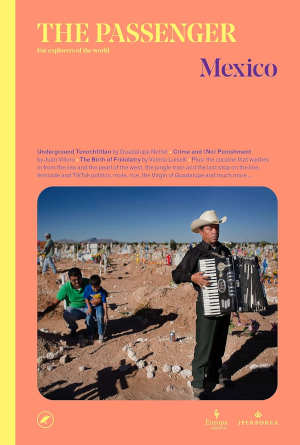The Passenger Mexico Verhalen van Mexicaanse auteurs over hun land. Op 26 september verschijnt een nieuw deel in de Engelstalige reeks van boek met verhalen uit landen en steden overal in de wereld. Deze keer gaat het om verhalen over Mexico van auteurs afkomstig uit het land.
The Passenger: Mexico – Verhalen van Mexicaanse auteurs
De Engelstalige reeks The Passenger worden met regelmaat nieuwe bundels uitgegeven met verhalen van en over de landen of steden waar de schrijvers en schrijfsters afkomstig zijn. Mexico is het land wat deze keer centraal staat. Je krijg je door het lezen van de verhalen een origineel, goed en bijzonder beeld van Mexico in al de rijke schakeringen.
The Passenger: Mexico
- Auteurs: Diverse schrijfsters en schrijvers (Mexico)
- Soort boek: Mexicaanse verhalen
- Taal: Engels
- Uitgever: Europa Editions, The Passenger
- Verschijnt: 26 september 2023
- Omvang: 192 pagina’s
- Uitgave: paperback / ebook
- Prijs: $ 22.00 / $ 14,99
- Boek bestellen bij: Amazon
Flaptekst van The Passneger over Mexico
Underground Tenochtitlan by Guadalupe Nettel, Crime and (No) Punishment by Juan Villoro, The Birth of Fridolatry by Valeria Luiselli, plus: the cocaine that washes in from the sea and the pearl of the west, the jungle train and the last stop on the line, femicide and TikTok politics, mole, rice, the Virgin of Guadalupe and much more…
Once synonymous with escape and freedom, Mexico is now more frequently described as a place plagued by widespread violence, drug trafficking, endemic corruption, and uncontrolled migration. Under the patina of a tourist paradise—with its beaches, its ancient ruins, its tequila—lies a complex, dynamic country trying to carve out a place for itself in the shadow of its powerful neighbor.
The most populous Spanish-speaking country in the world, Mexico is also home to 89 indigenous peoples and languages: one of the many contradictory legacies of the country’s colonial past, which still permeates its politics, society, religion, food, and culture. With a fifth of the population identifying as indigenous, the issue of rediscovering and revaluing the country’s pre-Columbian roots is at the center of the public debate. The controversial Mayan train project, which would connect Mexico’s Caribbean resorts with the South’s archaeological sites, crossing (and endangering) communities and forests, is a perfect example of the opposition between the two souls of the country.
The attempts to resolve this contradiction, or better still to learn to live with it, will define the Mexico of the future. Only by recognizing equal status to ethnic and linguistic minorities will the country be able to reconcile its fractured identity.
